MIT SCHOOL OF HUMANITIES, ARTS, AND SOCIAL SCIENCES
Media + Awards Digest | October 2019
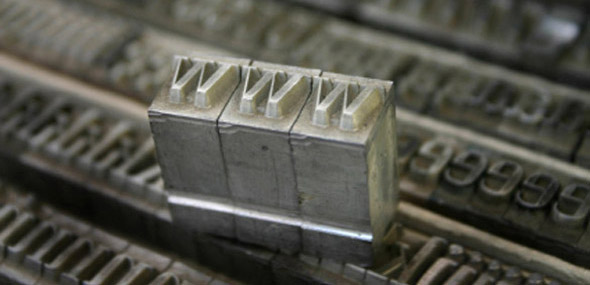
The Media + Awards Digest is a section of the Said and Done newsletter. Subscribe
RECENT HONORS + AWARDS
THE NOBEL PRIZE FOR ECONOMICS
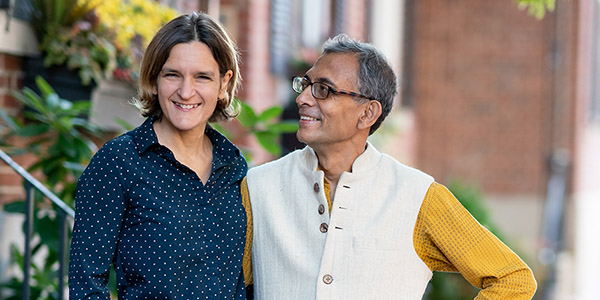
Photo: Bryce Vickmark
MIT ECONOMICS | ABDUL LATIF JAMEEL POVERTY ACTION LAB
Abijit Banerjee and Esther Duflo win the Nobel Prize for economics
Duflo and Banerjee, whose work has transformed poverty alleviation research and policy, have won the 2019 Sveriges Riksbank Prize in Economic Sciences in Memory of Alfred Nobel, sharing the prize with a longtime affiliate, economist Michael Kremer of Harvard. In their work, they have applied the precision of laboratory-style randonmized control trials while examining the many attributes of poverty and developing effective poverty alleviation programs.
Story by Peter Dizikes at MIT News | Video: Press Conference at MIT
Additional Coverage
The New York Times | The Washington Post | The Boston Globe | Janta (India) | BBC | Bloomberg | The Guardian | NPR | Vox | Agence France-Presse | Good morning America | CNBC // Sub.Req: The Wall Street Journal | Financial Times
Nobel Foundation: Telephone interview with Esther Duflo
CNN: Duflo hopes to inspire women to enter the economics field
Bloomberg: Economics Nobel Celebrates Asking the Right Questions
The Guardian: Congratulations, Esther Duflo. The world needs more female economists
Forthcoming book
Duflo's and Banerjee's new book, Good Economics for Hard Times, will be published this November, following their 2011 book, Poor Economics: A Radical Rethinking of the Way to Fight Global Poverty.
SCIENCE WRITING
Marcia Bartusiak wins the American Institute of Physics Science Writing Prize
In her most recent prize-winning book, Dispatches from Planet 3, Bartusiak delves into the untold backstories of momentous astronomical discoveries and shares a profound understanding of the nature of the universe. This award marks the third time Bartusiak has received the AIP's Science Writing Prize.
About
COMPARATIVE MEDIA STUDIES + CSAIL
Fox Harrell recieves MIT.nano seed grant
The grant is for Harrell's work on gaming on technologies, to "teach users how to recognize, cope with, and avoid committing microaggressions."
About
POLITICAL SCIENCE / SECURITY STUDIES
Vipin Narang receives ISSS 2020 Emerging Scholar Award
The award recognizes scholars who have made (through their body of publications) the most significant contribution to the field of security studies.
About
ECONOMICS
Parag Pathak named one of 10 young “Scientists to Watch” by Science News
Pathak, the Jane Berkowitz Carlton and Dennis William Carlton Professor of Microeconomics at MIT, has been named by Science News as one of 10 early- and mid-career scientists with great potential to shape the future of their field.
Story by SHASS News | Feature at Science News
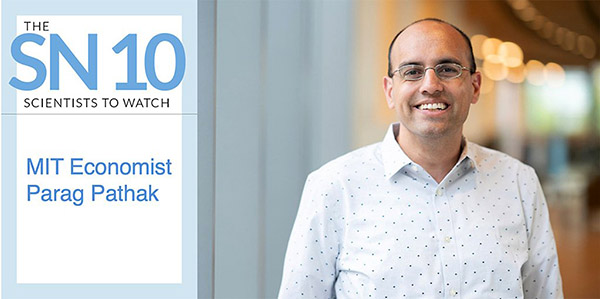
MIT SHASS IN THE MEDIA
HISTORY AND CIVICS
TIME
Citizenship Day used to be 'I Am an American Day' | Christopher Capozzola
In several ways, the observance was an assertion of the nation’s values. For one thing, the early May timing can be seen as, in part, an effort to “steal the thunder” from May Day celebrations of the global labor movement, says MIT historian Christopher Capozzola, an expert on the history of citizenship. “May Day celebrations scared a lot of people. ‘I Am An American Day’ was a bit of a challenge to that.”
Story at Time
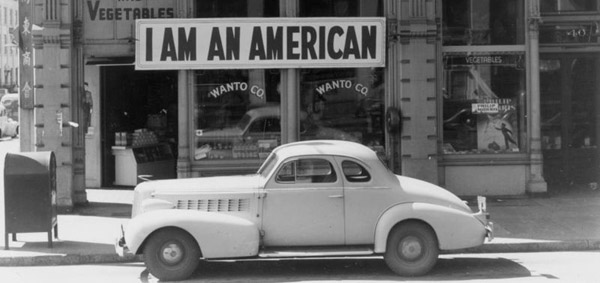
ECONOMICS
REUTERS/NYT
U.S. economists wrestle with how to help 'left behind' areas | David Autor
"There is strong consensus there is a problem...We don't know quite what to do about it," said David Autor, a Massachusetts Institute of Technology labor economist whose research on the "China shock" helped frame debate about the disproportionate impact China's rise had on U.S. manufacturing hubs.
Story at Reuters
NEWSWEEK
Trump's message to troubled developing countries? Figure it out on your own.
Here's why that's not a smart move.
As Daron Acemoglu, MIT professor and co-author with James Robinson of the bestselling Why Nations Fail and the forthcoming Narrow Corridor: States, Society, and the Fate of Liberty, says, "While bad government may not work for the majority, it always works for someone, and those it works for are usually those at the top."
Story at Newsweek
BOSTON GLOBE
Will robots kill our jobs? Questions on automation and America’s future | David Autor
A major task force at MIT issued a thought-provoking report last month that said Americans have valid concerns about whether robots will take their jobs, but technology itself is not to blame — and concluded by offering a number of pro-worker policy recommendations to the help the country cope as change continues.
Story at the Boston Globe
THE WASHINGTON POST
Are jobs lost to 'bad trade policy' or automation? | Daron Acemoglu
A footnote in a paper by Acemoglu and Pascual Restrepo suggests robots reduced employment by about 750,000 jobs between 1993 and 2007; estimates of the impact of China trade are about 2½ times as large, according to some estimates. “Note, however, that robots are just one type of automation,” Acemoglu told The Fact Checker. “If you put other types of automation technologies, it is probably to be comparable to China trade, but we don't have as reliable estimates of the impact of things such as numerically controlled machines, computerized numerical control and dedicated automated machinery.”
Story at The Washington Post
NPR
Renters only: these new homes aren't for sale | William Wheaton
"Owning still makes much more sense," says Wheaton, a housing economist at MIT. He says these rental homes are fine short term, but he hopes young people don't wait too long to buy into the housing market.
Story at NPR
FORBES
AI only goes so far in today’s economy | MIT Work of the Future
“We are a long way from AI systems that can read the news, re-plan supply chains in response to anticipated events like Brexit or trade disputes, and adapt production tasks to new sources of parts and materials,” state the report's authors, economist David Autor, historian David Mindell, and Elisabeth Reynolds, all of MIT.
Story at Forbes
FINANCIAL TIMES
Mario Draghi declares victory in battle over the euro | MIT alumnus
The son of a central banker, Draghi enjoyed impeccable credentials for the ECB post: a long career at the Italian Treasury and Bank of Italy; a doctorate in economics from the Massachusetts Institute of Technology; and a stint at Goldman Sachs, that helped him learn how to communicate with financial operators.
Interview at the Financial Times
WIRED
Killing ‘dead-end’ jobs blocks career opportunity | Work of the Future
This could deepen the wealth and opportunity chasm that has been opening up in urban areas. MIT's freshly minted “The Work of the Future” report pulls together a great deal of superb recent research to show that, since the 1970s, less-educated workers have seen less and less opportunity in cities.
Story at Wired
QUARTZ
More women in AI will improve the future of work | Daron Acemoglu
In a recent paper about AI and the future of labor, economists Daron Acemoglu of MIT and Pascual Restrepo of Boston University argue that recent technological progress has focused too much on automation and too little on creating tasks that result in people being productively employed in new jobs.
Story at Quartz
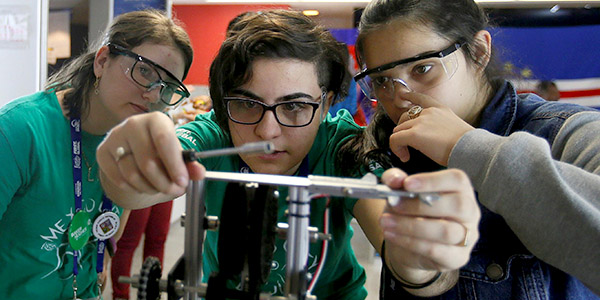
Image via Quartz (Reuters/Andres Stapff)
VOX
Sanders's plan to eliminate medical debt, explained | Amy Finkelstein
“Health insurance still leaves Americans exposed to much more economic risk from poor health,” Amy Finkelstein, an economics professor at MIT who has studied medical debt, especially compared to other countries with social insurance that better protect their citizens from the economic loss in the event of sickness or injury.
Story at Vox
WALL STREET JOURNAL
Government urged to boost R&D spending | David Autor
In robotics, the U.S. should follow the example of Germany, which funds R&D but also develops standards and certification bodies that promote the use of robots, said David Autor, professor of economics at MIT. “Investments in human capital, having proper incentives, and having good institutions that kindle productivity are incredibly important.”
Article at the Wall Street Journal (subscription req)
POLITICAL SCIENCE
PROBABLE CAUSATION
Podcast with Ariel White on voting
White discusses the demobilizing effects of brief jail spells on subsequent voting behavior.
Episode 13: Ariel White at "Probable Causation"
Related: Misdeamnor Disenfranchisement? by Ariel White, American Political Science Review
AXIOS
Automation, immigration, and fear | Baobao Zhang
Zhang's studies show that even when presented with evidence that automation is the far greater risk to jobs, people with anti-immigration and anti-trade views continue to hold them — and are also no more likely to support job retraining. "It may be that cultural factors play a substantial role in protectionist sentiments," says Darrell West, director of the Center for Technology Innovation at Brookings. "Workers may worry about immigrants taking their jobs as automation kicks in but also be concerned about what that will mean for American identity."
Story at Axios
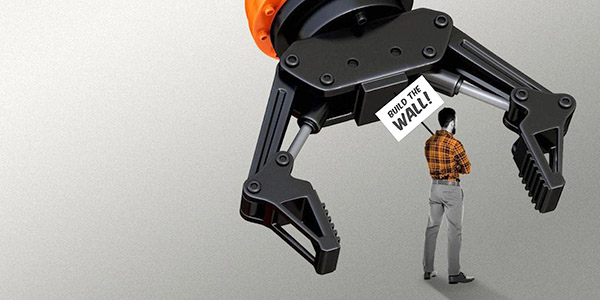 Illustration: Sarah Grillo/Axios
Illustration: Sarah Grillo/Axios
Study: Even when presented with evidence that automation is the far greater risk to jobs [than immigration and trade] people with anti-immigration and anti-trade views continue to hold them—and are also no more likely to support job retraining programs. What are the underlying issues and what's the solution?
Related: Why Facts Don't Change Our Minds
New discoveries about the human mind show the limitations of reason. Article by Elizabeth Kolbert, The New Yorker, February 19, 2017
POLITICAL SCIENCE / SECURITY STUDIES
THE WASHINGTON POST
Analysis: Trump appears to confirm U.S. nukes are in Turkey | Vipin Narang
Vipin Narang, a nuclear proliferation expert at MIT, highlighted another issue with Trump saying that “we have a great air base there.” “Incirlik is Turkey's air base, not ours,” Narang said. “And that is essentially the problem. We store these nuclear weapons in secure vaults on a Turkish air base, where we either have to secure them under the present circumstances, or bring transport aircraft to the base."
ASSOCIATED PRESS
Why no N. Korea spotlight at UN? | Vipin Narang
“It certainly looks like neither side wants to stir the pot,” said Vipin Narang, a North Korea expert at MIT. He is optimistic that lower-level nuclear talks could start soon, because of a recent break in weapons tests, Trump's firing of his hawkish national security adviser, John Bolton, and the U.S. president's need for a win as lawmakers pursue impeachment.
Story by the Associated Press
REUTERS
N. Korea fires ballistic missile, days before talks | Vipin Narang
“The risk is that testing such a system causes the U.S. to walk away before this weekend, but Kim probably bet that the U.S. is so invested in the talks taking place and making progress ... that the U.S. won’t walk away.”
Story at Reuters
REUTERS
North Korea doubts U.S. will have alternative plans inside two weeks | Vipin Narang
Narang, a nuclear affairs expert at the Massachusetts Institute of Technology, added that North Korea is also buying time to continue to expand and improve its missile and nuclear force, and negotiate the terms by which it is accepted as a nuclear weapons power.“
Story at Reuters
SCIENCE, TECHNOLOGY, AND SOCIETY
WALL STREET JOURNAL
Review of Zwicky | by science writer Marcia Bartusiak
Not a standard biography, Zwicky: The The Outcast Genius Who Unmasked the Universe reads more like a stylish Sunday magazine profile, which is not surprising given Mr. Johnson's many years as a science reporter for The Los Angeles Times.
Review at the Wall Street Journal (subscription req.)
NATURE
On the history of funding for science | David Kaiser
MIT historian and physicist David Kaiser traces the roots of government support for science in this illuminating essay — the first in a series marking the 150th anniversary of the journal Nature. The series puts present-day trends in scientific research into broader historical context, looking back between 1869 and today.
Kaiser commentary | Related commentary

Image via Nature
The Media + Awards Digest is a section
of Said and Done, the School's online newsletter.
STAY IN TOUCH
Follow us
![]()
![]()
Subscribe to Said and Done
10 issues a year
In the Media
Recent coverage
Research Impact
Explore
Ethics, Computing, and AI: Perspectives from MIT
Browse the Series
Computing and AI: Humanistic Perspectives from MIT
Browse the Series
MIT Climate website | SHASS research
A major source of research, innovation, and discussion
Join us!
SHASS on MIT News
Research and Features
MIT Campaign for a Better World
Story| Join Us
Videos
Watch

Published by SHASS Communications
Office of the Dean, MIT School of Humanities, Arts, and Social Sciences
Editor and Designer: Emily Hiestand
Publication Associate: Alison Lanier
Published 16 October 2019